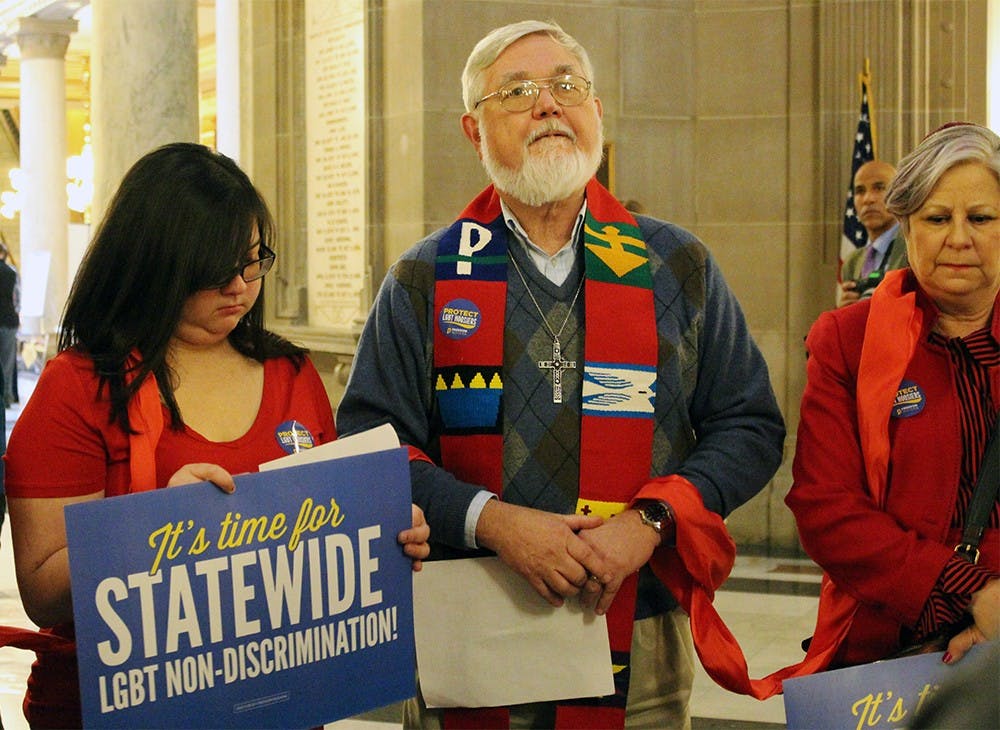Republicans in the state Senate Judiciary Committee killed a bill that would have repeated the controversy of the Religious Freedom Restoration Act by protecting religious liberties while providing no safeguards against discrimination for LGBT individuals.
Senate Bill 66, known as “super-RFRA,” would have made it more difficult for the government to pass laws regulating the exercise of religion, free speech and the right to bear arms.
However, the bill contained no clause prohibiting businesses from using the law to discriminate against LGBT individuals based on religious objection.
Two other LGBT-related bills in addition to SB 66 were also discussed in the Senate Wednesday. Late afternoon, the Senate Committee for Rules and Legislative Procedure had a hearing to discuss Senate Bill 100 and Senate Bill 344. Both bills aimed to provide specific protections to LGBT individuals.
After four hours of testimony, the committee approved an amended version of SB 344 in a 7-5 decision. Legislators added safeguards against discrimination based on sexual orientation and veteran status. Local government agencies also cannot refuse legal documents such as marriage licenses.
However, faith-based organizations, including adoption agencies, can refuse services based on religious objections. Transgender individuals have no legal protections against discrimination under the bill.
SB 344 will be deliberated by the full Senate. The committee didn’t move to vote on SB 100.
During the SB 66 committee meeting, audience members crowded Room 130 in the Statehouse as Sen. Michael Young, R-35th district, testified in favor of SB 66.
“No matter who is in this room today, no matter what you believe in, I am protecting every one of your rights,” he said.
After Young’s statement, Sen. Brent Steele, R-44th district, Chair of the Senate Judiciary Committee, shut down the bill, citing “mischaracterization” by opposition. The chair accepted no testimonies.
Peter Hanscom, initiative director of Indiana Competes, a business coalition that advocates for LGBT civil rights protections, said SB 66 is a distraction. He said the risk of discrimination can be solved by including LGBT groups in Indiana’s civil rights laws.
“No Indiana business is against religious freedom or the ability to freely exercise religion. That’s already protected,” Hanscom said. “The true problem here is that people woke up and realized, in the year 2016, in the state of Indiana, you can get fired from your job for being LGBT.”
In March 2015, the state received national backlash when it voted RFRA into law because the bill did not prohibit businesses from using religious objection to discriminate against LGBT groups.
A month later, legislators amended the bill to include these protections for LGBT groups. However, authors of the SB 66 did not include these safeguards.
The bill’s extended protections to the freedom of speech and the right to bear arms is unprecedented, said Daniel Conkle, Robert H. McKinney professor of law at IU Maurer School of Law.
He said he is unsure as to how the law would be applied to regulate these rights.
Curt Smith, president of the biblical non-profit lobbying group Indiana Family Institute, said he was disappointed by the committee’s decision to kill SB 66, but could see the action as a way of getting more votes for LGBT-specific legislation.
“It’s a fresh and novel idea,” Smith said in reference to SB 66.
Despite the concerns organizations have expressed regarding the bills, Smith said the ambiguity of SB 66 is a better option than controlling legislation.
“I think we ought to affirm freedom for our founding values,” Smith said. “Freedom is messy, but its better than all the alternatives.”






